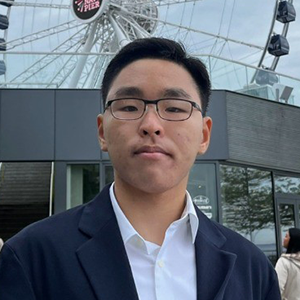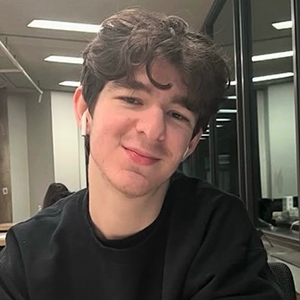SURA 2025 Student Blog
Get all our news
Each summer since 1998, the Institute for Policy Research (IPR) has run the Summer Undergraduate Research Assistants (SURA) program, which gives undergraduate students first-hand experience in the conceptualization and conduct of policy-relevant social science research. In a series of blog posts this fall, SURA students are sharing their summer research experience from their own perspective
Christina Vargas: Investigating How Social Environments Shape Health and Wellbeing

Christina Vargas is working with IPR health psychologist Edith Chen to investigate general health and wellbeing and the impact of social environments.
This summer, through the SURA program, I worked with Dr. Edith Chen at the Foundations of Health Research Center. As a research assistant, I completed literature reviews and helped with ongoing studies. I contributed to two major studies: the Connections Study and the Mentoring and Health Study, which aim to investigate general health and wellbeing and the impact of social environments.
I felt excited to join a lab at Northwestern that conducts research relevant to the global context and our current society. The lab’s research is crucial as we navigate a world with increasing inequalities and negative health outcomes. Understanding the relationships between our environments, stress, and access to resources—and the effects these have on overall health—can help influence policy and create interventions that address social inequalities.
Through SURA and my lab position, I gained a lot of knowledge that shaped my understanding of research and its impact on society. Before working at the lab, I had a basic understanding of the relationship between social environments and physical health. I learned more about those relationships and about the effects of potential interventions, such as mentoring and stable housing. This experience gave me the chance to explore my interests and work as part of a team.
The lab showed me that research is really all about teamwork, which I had always been indifferent to. But working there made me appreciate all the details and effort that go into the process. At any given time, we completed multiple steps—literature reviews, data collection, data analysis—and worked together toward the same goal. I also gained insight into how influential research findings can be when it comes to policymaking and creating beneficial interventions.
This experience allowed me to learn more about myself while building my skills. I’m excited to have participated in SURA and to have contributed to the lab during my final year at Northwestern.
Christina Vargas is a rising senior from Milwaukee studying psychology and global health. Her research interests center around social inequalities and access to mental health and other resources. In her free time, she enjoys soccer, traveling, and spending time with family and friends.
Henry Park: Analyzing Continuous Improvement Work Plans to Understand School Characteristics
 Henry Park is working with IPR labor and education economist Kirabo Jackson to examine how Chicago Public Schools engage with Continuous Improvement Work Plans (CIWPs), using both qualitative coding and AI-assisted analysis to assess their depth and effectiveness as improvement tools.
Henry Park is working with IPR labor and education economist Kirabo Jackson to examine how Chicago Public Schools engage with Continuous Improvement Work Plans (CIWPs), using both qualitative coding and AI-assisted analysis to assess their depth and effectiveness as improvement tools.
This summer, I helped Dr. Kirabo Jackson analyze the written contents of Continuous Improvement Work Plans (CIWPs) for 31 elementary school (grades K–8).
In the United States, the Every Student Succeeds Act (ESSA) holds public K–12 schools accountable for student performance. Under ESSA, school districts with underperforming schools must develop School Improvement Plans. Chicago Public Schools (CPS) uses the CIWP as its tool for school improvement planning. Every CPS school submits a plan that outlines its curricular and instructional practices and strategies for future improvement. CPS provides a CIWP template that includes performance-related rubrics and relevant subsections to guide administrators.
I identified—and later coded—recurring themes in curriculum and instruction. We wanted to understand the characteristics that distinguished high-performing and low-performing schools, and the extent to which schools engaged with the CIWP process. How much detail did they provide? Did they see it as a genuine tool for educational improvement?
I started this project with a genuine interest in the topic but limited experience in qualitative research. I spent the first weeks earning a research certificate and reviewing dozens of papers to understand methodologies and vocabulary in the field. Building this foundation helped later when I designed a methodology to analyze CIWPs.
Over the summer, Dr. Jackson and I created a coding guide (an interview protocol for documents) to take more organized, reliable notes, and we developed code labels to highlight recurring themes. I learned so much about keywords and stakeholders in education, such as cultural responsiveness, differentiated instruction, and diverse learners.
But my favorite part of this project, by far, was using AI tools. At one point, we needed new perspectives on the CIWPs and explored how AI could help. I was surprised by the number of publications on AI skills and tools like prompt engineering and vibe coding. We tried a lot of methodologies, keeping records of all of our experiments, and eventually, we found a human-AI workflow that worked best for our project.
I am so thrilled by how we maintained ethos with our own creative twists, and I enjoyed venturing into qualitative research and AI this summer.
Henry Park is a rising junior from Chicago studying data science. He applied to SURA to experience working in a research environment while expanding his data science skill set. In his free time, he enjoys going to the gym, listening to podcasts, and spending time with friends and family.
Michael Jurek: Investigating School Systems and Student Transitions
Michael Jurek is working with IPR social psychologist Mesmin Destin to understand students’ behaviors and motivations
This summer, I worked on research projects that investigated schooling and student transitions in multiple contexts. I focused on existing systems in schools across various grade levels and settings. This community-focused education research helped us understand students’ behaviors and motivations. When research works to better schools and student experiences, crucial change can be created. While working in the research lab, I had the opportunity to read about the experiences of students who have been impacted by the tangible work conducted by my lab. My growth over time in the research lab has also impacted my life greatly and has changed the way I will interact with education systems and research.
better schools and student experiences, crucial change can be created. While working in the research lab, I had the opportunity to read about the experiences of students who have been impacted by the tangible work conducted by my lab. My growth over time in the research lab has also impacted my life greatly and has changed the way I will interact with education systems and research.
Before SURA, I had no research experience, and the concept of education research felt inaccessible. I gained completely new skills by working closely with doctoral and postdoctoral researchers, my faculty advisor Dr. Mesmin Destin, and fellow undergraduates. I used multiple coding platforms and built codes for qualitative and quantitative research. I read literature on school-based field experiments and education theory, which broadened my knowledge of the field. I also completed data analysis and cleaning.
My faculty advisor, other undergraduate researchers, and SURA taught me new things about research. They helped me understand the dedication and time research requires. I have learned that research can be observed in daily work throughout campuses and in spaces where academic classrooms thrive. Research has given me a better understanding of academic spaces. I gained independence in research and work in general, which supported my personal growth in an academic setting. I look forward to returning to Northwestern in my third year with this experience, where I can build on what I learned.
Michael Jurek is a rising junior from Chicago studying learning sciences and political science. He is interested in education research, especially community and teacher impact. In his free time, he enjoys reading, writing, listening to music, and playing pickleball with friends.
Published: September 19, 2025.


